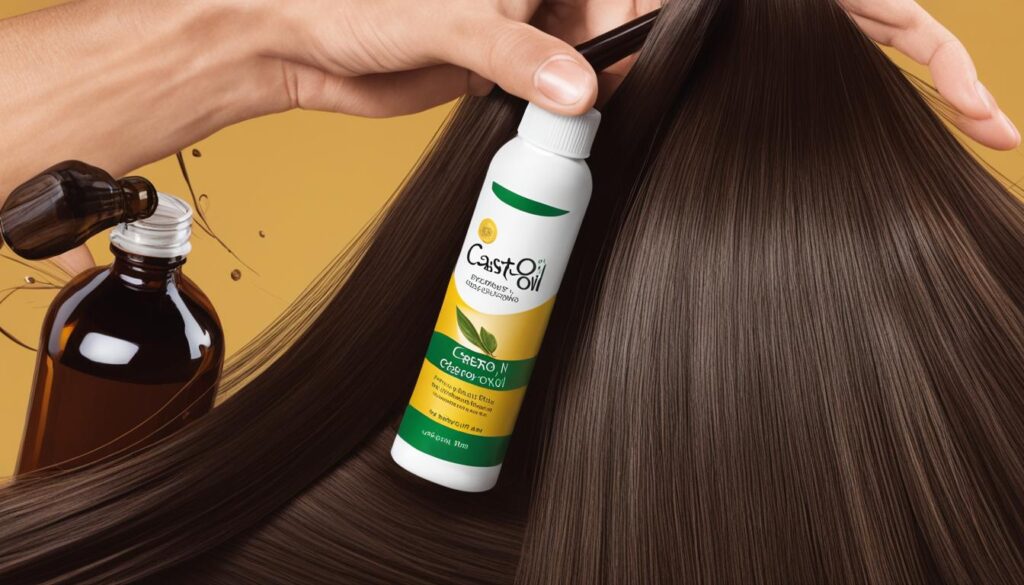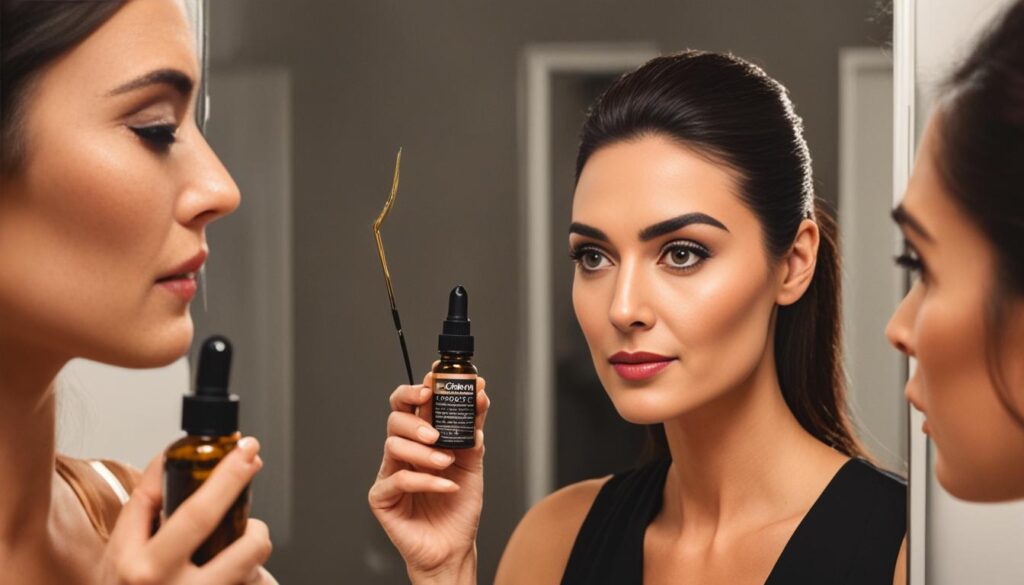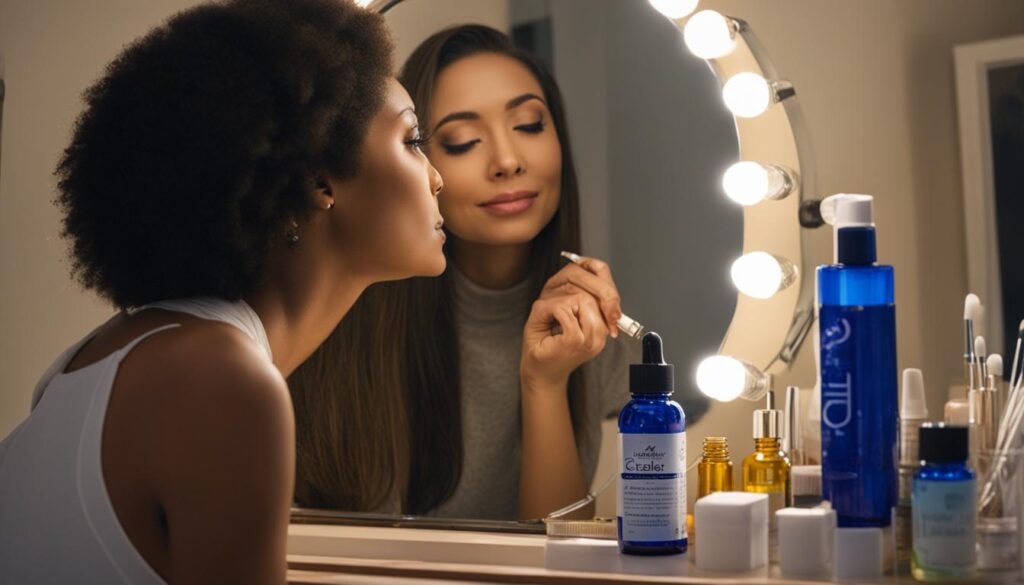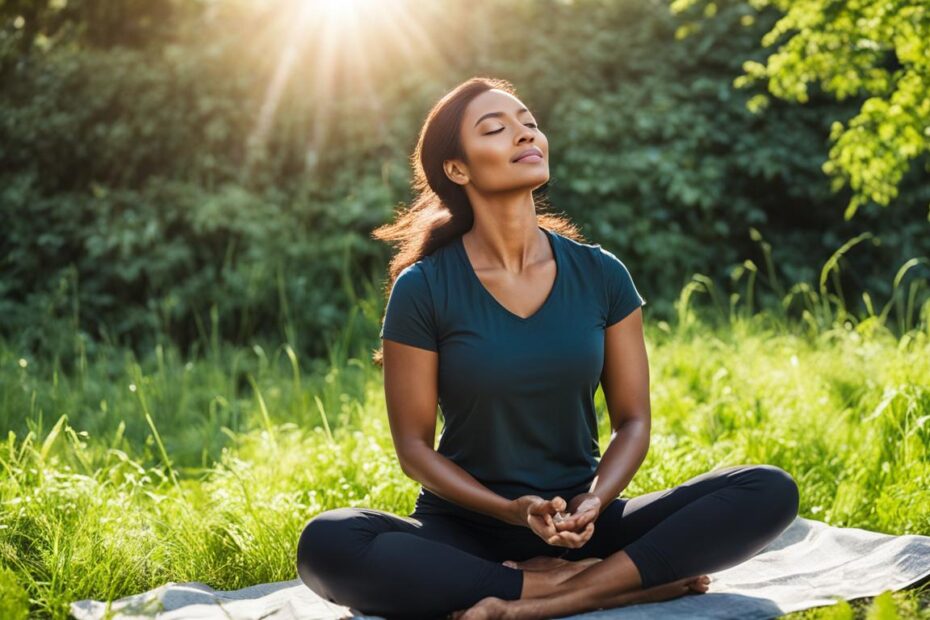Are you struggling with hair growth and considering using castor oil? Many people swear by the benefits of castor oil for promoting hair growth, but is it really effective? In this article, we will explore the timing and methods of using castor oil for hair growth.
While scientific evidence is limited, castor oil is believed to moisturize the scalp, reduce dandruff, and improve hair smoothness, strength, and shine. Some even claim that it can promote hair growth in areas such as eyebrows and eyelashes. These benefits may be attributed to castor oil’s antioxidant and anti-inflammatory properties, as well as its omega-6 fatty acids content. However, further research is needed to confirm these claims.
Key Takeaways:
- Castor oil is believed to moisturize the scalp and improve hair health.
- Some claim that castor oil can promote hair growth in eyebrows and eyelashes.
- Scientific evidence supporting the effectiveness of castor oil for hair growth is limited.
- More research is needed to confirm the claims about castor oil’s benefits for hair growth.
- If considering using castor oil for hair growth, it’s important to consult a healthcare provider.
The Health Benefits of Castor Oil for Hair
Castor oil is often claimed to have various benefits for hair health and growth. These claims include:
- Increased blood flow to the scalp, which can promote healthier hair
- The ability to boost hair growth up to five times the normal rate when applied just once a month
- Moisturizing a dry, irritated scalp
- Reducing dandruff with its antibacterial and antifungal properties
- Promoting hair growth in eyebrows and eyelashes
While these claims are largely based on anecdotal evidence, some of the compounds found in castor oil, such as antioxidants and omega-6 fatty acids, may potentially contribute to these benefits.
How to Use Castor Oil for Hair Growth
When it comes to using castor oil for hair growth, proper application is key. Follow these steps for optimal results:
- Directly apply to the scalp: Start by applying a few drops of castor oil directly to your scalp. Gently massage it in using circular motions to stimulate the hair follicles.
- Apply to midsection and ends: To protect your hair against breakage and improve its texture, apply a small amount of castor oil to the midsection and ends of your hair. Avoid applying too much, as castor oil can be heavy and sticky.
- Dilute with carrier oils: Since castor oil is thick and viscous, it’s recommended to dilute it with carrier oils like coconut or jojoba oil. This helps to make it easier to apply and prevents buildup and matting. Use a 1:1 ratio of castor oil to carrier oil.
- Limit frequency: To avoid excessive buildup and heaviness, it’s best to use castor oil for hair growth no more than once a week. This frequency allows enough time for the oil to penetrate the scalp and hair follicles without weighing your hair down.
- Leave it on for two hours: For optimal absorption, leave the castor oil on your hair for about two hours. This allows the oil to deeply penetrate the scalp and nourish the hair strands.
Remember, it’s important to perform a patch test before applying castor oil to your skin. Apply a small amount of the diluted oil to a small area of your skin and wait 24 hours to check for any allergic reactions or irritations.

Using Castor Oil for Eyebrows
One of the popular uses of castor oil is for promoting eyebrow growth. Many people have found success in using castor oil to improve the thickness and fullness of their eyebrows. The natural properties of castor oil, such as its high vitamin E content and moisturizing capabilities, make it an ideal choice for nourishing and conditioning the eyebrow hair follicles.
To apply castor oil to the eyebrows, you will need a clean brush or a Q-tip. Here’s a step-by-step guide:
- Cleanse your face and remove any makeup or debris from your eyebrows.
- Dip the brush or Q-tip into the castor oil.
- Gently brush the oil onto your eyebrows, ensuring that all the hair is coated.
- Leave the oil on for a few hours or overnight to allow it to work its magic.
- Wash off the oil using a gentle cleanser or warm water.
It is important to be cautious when applying castor oil to your eyebrows and avoid getting it in your eyes. If any irritation occurs, wash off the oil immediately and discontinue use.
Remember that consistent and regular application of castor oil is key to seeing results. Incorporate this into your skincare routine, and you may notice improvements in the thickness and overall appearance of your eyebrows over time.
Table: Pros and Cons of Using Castor Oil for Eyebrows
| Pros | Cons |
|---|---|
| Nourishes and moisturizes eyebrow hair follicles | Potential risk of irritation or allergic reactions |
| May enhance the thickness and fullness of eyebrows | Results may vary depending on individual |
| Cost-effective and easily accessible | Requires consistent and regular application |

Using Castor Oil for Eyelashes
Castor oil is a popular choice for promoting eyelash growth. Applying castor oil to the top and bottom lashes can help nourish and strengthen them, leading to fuller and longer lashes. Here’s how to use castor oil effectively for your eyelashes:
Application:
To apply castor oil to your eyelashes, it is important to have clean lashes and a clean brush or mascara wand. Follow these steps for proper application:
- Dip a clean brush or mascara wand into the castor oil.
- Carefully apply the oil to your top and bottom lashes, starting from the roots and moving towards the ends.
- Avoid getting the oil in your eyes. If any oil gets into your eyes, rinse immediately with water.
“Applying castor oil to your eyelashes can help nourish and strengthen them, leading to fuller and longer lashes.”
Duration:
After applying the castor oil to your eyelashes, leave it on for a few hours or overnight. This allows the oil to penetrate the lashes and provide maximum nourishment. Be careful not to rub your eyes while the oil is applied.
Removal:
To remove the castor oil from your eyelashes, use a gentle makeup remover or cleanse your face with a mild cleanser. Make sure to rinse your eyes thoroughly to avoid any residual oil.
It is important to note that if you experience any irritation or discomfort while using castor oil on your eyelashes, discontinue use immediately and consult a healthcare professional.
Here is an image that illustrates the application of castor oil on eyelashes:

Using castor oil for eyelashes can be a natural and cost-effective way to enhance the appearance of your lashes. With regular use, you may notice thicker and longer lashes over time. However, individual results may vary, and it is important to manage expectations. If you have any concerns or specific conditions related to your eyelashes, it is recommended to consult a healthcare professional for personalized advice.
Choosing the Right Castor Oil for Hair Growth
When it comes to purchasing castor oil for hair growth, there are a few factors to consider to ensure you’re choosing the right product. Cold-pressed oils are often preferred over those processed with heat as they are believed to retain more nutrients and be of higher quality. Cold-pressed castor oil is extracted from castor seeds without subjecting them to high temperatures, preserving its natural properties.
One popular type of castor oil for hair growth is Jamaican black castor oil. Made from roasted castor beans, it is commonly used for thick, dry, and coarse hair. Jamaican black castor oil has a darker color and a thicker consistency compared to other types of castor oil, making it an ideal choice for those with deeper hair tones.
It’s important to store castor oil properly to maintain its efficacy. Castor oil should be kept in a cool, dark place away from direct sunlight and extreme temperatures. Exposure to heat and light can degrade the oil’s quality and potency over time. Additionally, it is recommended to use castor oil within one year after opening to ensure maximum freshness and effectiveness.
Potential Side Effects of Using Castor Oil
While castor oil is generally considered safe for external use, there are some potential side effects to be aware of. It is important to understand these risks and take necessary precautions before using castor oil.
Allergic Reactions and Skin Irritation
Some individuals may be allergic to castor oil, resulting in skin irritation or allergic reactions. Before applying castor oil to the skin, it is recommended to do a patch test. Apply a small amount of diluted castor oil to a small area of skin and monitor for any adverse reactions such as redness, itching, or swelling. If any signs of allergy or irritation occur, discontinue use immediately.
Ingestion of Castor Oil
It is important to note that castor oil should never be ingested without proper medical guidance.
Ingesting castor oil can have severe side effects and should be avoided. Consumption of large quantities of castor oil can lead to abdominal cramps, diarrhea, dizziness, fainting, hallucinations, nausea, shortness of breath and chest pain, skin rash, and throat tightness.
It is crucial to consult a healthcare professional before considering any form of ingestion of castor oil. They will be able to provide appropriate guidance and ensure your safety.
Table
| Potential Side Effects | Precautions |
|---|---|
| Abdominal cramps, diarrhea, dizziness, fainting, hallucinations, nausea, shortness of breath and chest pain, skin rash, throat tightness | Avoid ingestion of castor oil |
| Allergic reactions and skin irritation | Perform a patch test before applying castor oil to skin |
Remember, it is always better to err on the side of caution and prioritize your safety when using castor oil.
Tips for Using Castor Oil on Hair
When using castor oil on the hair, it is important to follow a few tips to ensure the best results and avoid any potential issues. Here are some helpful tips for using castor oil in your hair care routine:
1. Protect your clothing and bedding
Castor oil is thick and can stain fabrics easily. To prevent any staining, it is recommended to cover your head with a shower cap, an old t-shirt, or a towel while the oil is in your hair. This will protect your clothing, bedding, and furniture from getting stained.
2. Use an effective washing routine
Castor oil can be challenging to wash out due to its density. To ensure complete removal, it may be necessary to wash your hair using shampoo twice. This will help to remove any residue and prevent any greasiness or buildup in your hair.
3. Consult a healthcare provider for hair loss concerns
If you are experiencing significant hair loss or developing bald spots, it is advisable to consult a healthcare provider for a proper diagnosis and treatment. While castor oil may have some benefits for hair health, it is essential to address underlying causes of hair loss with professional guidance.
| Tips for Using Castor Oil on Hair |
|---|
| Protect your clothing and bedding |
| Use an effective washing routine |
| Consult a healthcare provider for hair loss concerns |
Please note that individual results may vary, and it’s always best to consult with a healthcare professional before incorporating any new product into your hair care routine.
The Myth vs Reality of Castor Oil for Hair Growth
While many people claim that castor oil can promote hair growth, the reality is that there is currently no scientific evidence to support this claim. Although castor oil is believed to have some beneficial properties for hair health, such as moisturizing the scalp and reducing dandruff, its effectiveness in promoting hair growth is yet to be proven.
The testimonies of improved hair growth from using castor oil are mainly anecdotal, and individual experiences may vary. It is important to manage expectations when using castor oil for hair growth and to consult a healthcare provider for other proven hair loss treatments.
“Although castor oil is often recommended for hair growth, there is currently no scientific evidence to support its effectiveness in this regard. While it may have some benefits for hair health, such as moisturizing the scalp and reducing dandruff, its ability to promote actual hair growth is still uncertain.”
What the Science Says
Several studies have been conducted to investigate the effects of castor oil on hair growth. However, the results have been inconclusive, with no significant evidence supporting its role in promoting hair growth.
One study published in the Journal of Cosmetic Science found that castor oil, when applied to the scalp, may penetrate the hair follicles and improve their health. However, the study did not provide conclusive evidence regarding its effects on hair growth.
Another study published in the International Journal of Trichology investigated the effects of a topical application of castor oil on hair loss. The study concluded that more research is needed to determine the efficacy of castor oil in preventing hair loss and promoting hair growth.
Managing Expectations
While castor oil may not directly stimulate hair growth, it can still contribute to overall hair health. Its moisturizing properties can help nourish the scalp and prevent dryness, which may promote healthier hair growth.
Additionally, using castor oil as part of a regular hair care routine, alongside other hair-friendly practices such as maintaining a balanced diet, proper hydration, and minimizing heat and chemical damage, may improve the overall appearance and condition of the hair.
Consulting a Healthcare Provider
If you are experiencing significant hair loss or are concerned about the condition of your hair, it is advisable to consult a healthcare provider, such as a dermatologist or trichologist. They can assess your specific situation, identify any underlying causes of hair loss, and recommend appropriate treatment options based on scientific evidence and clinical expertise.
| Myth | Reality |
|---|---|
| Castor oil can promote hair growth. | There is no scientific evidence supporting this claim. |
| Castor oil is a proven hair loss treatment. | It is not recognized as a proven treatment for hair loss. |
| Castor oil can increase hair growth rate. | Its effects on hair growth rate have not been scientifically proven. |
Despite the lack of scientific evidence, many individuals continue to use castor oil for their hair. It is ultimately a personal choice, and while it may not have the desired effect on hair growth, it can still provide nourishment and contribute to overall hair health when used appropriately.
Conclusion
In conclusion, castor oil is a popular choice for those seeking to improve hair growth. While there is limited scientific evidence supporting its effectiveness, castor oil is believed to have some benefits for hair health. It can moisturize the scalp, reduce dandruff, and improve overall hair texture and shine.
However, it is important to note that the ability of castor oil to promote hair growth is still uncertain. The claims are largely based on anecdotal evidence, and more research is needed to confirm its efficacy. Therefore, it is advisable to approach the use of castor oil for hair growth with caution.
If you are experiencing significant hair loss or looking for more effective treatments, it is recommended to consult a healthcare provider. They can provide you with proven options tailored to your specific needs. While castor oil may have some beneficial properties, it is essential to explore all available options for optimal results.
FAQ
When should you use castor oil for hair growth?
Castor oil can be used for hair growth as a moisturizer, scalp treatment, and to improve hair strength, smoothness, and shine. While there is limited scientific evidence to support its effectiveness, many people use castor oil for hair growth. It is important to note that the results may vary, and it is advisable to consult a healthcare provider for other proven hair loss treatments.
What are the health benefits of castor oil for hair?
Castor oil is believed to moisturize the scalp, reduce dandruff, and improve hair smoothness, strength, and shine. Some experts suggest that these benefits may be due to its antioxidant and anti-inflammatory properties, as well as its content of omega-6 fatty acids. However, more research is needed to confirm these claims.
How should you use castor oil for hair growth?
When using castor oil for hair growth, it is best to apply a few drops directly to the scalp and massage it in. For the rest of the hair, the oil can be applied to the midsection and ends to protect against breakage and improve texture. It is recommended to dilute castor oil with other carrier oils like coconut or jojoba and to use it no more than once a week to avoid buildup and matting. The oil should be left on for about two hours before washing it out. It is important to do a patch test before applying castor oil to the skin and to avoid using it near the eyes.
How can castor oil be used for eyebrows?
To promote eyebrow growth, castor oil can be applied using a clean brush or Q-tip. The oil should be left on for a few hours or overnight before washing it off. It is important to avoid getting the oil in the eyes and to wash it off immediately if any irritation occurs.
How can castor oil be used for eyelashes?
To promote eyelash growth, castor oil can be applied to the top and bottom lashes using a clean brush or mascara wand. The oil can be left on for a few hours to overnight before washing it off. It is essential to avoid getting the oil in the eyes and to wash it off if any irritation occurs.
What type of castor oil is best for hair growth?
Cold-pressed castor oils are often considered to be of higher quality and more nutrient-rich than those processed with heat. Jamaican black castor oil, made from roasted castor beans, is a popular choice for thick, dry, and coarse hair. It is important to store castor oil properly and use it before it reaches its shelf-life, which is typically around one year after opening.
Are there any potential side effects of using castor oil?
While castor oil is generally considered safe for external use, there are some potential side effects to be aware of. These can include abdominal cramps, diarrhea, dizziness, fainting, hallucinations, nausea, shortness of breath and chest pain, skin rash, and throat tightness. It is important to do a patch test before applying castor oil to the skin and to avoid ingesting large amounts of it.
What tips should be followed when using castor oil on hair?
When using castor oil on the hair, it is recommended to cover the head with a shower cap, old t-shirt, or towel to prevent the oil from staining clothing or other items. It may require two applications of shampoo to completely remove the oil from the hair. If experiencing significant hair loss or developing bald spots, it is advisable to consult a healthcare provider for proper diagnosis and treatment.
Is castor oil effective for hair growth?
While many people claim that castor oil can promote hair growth, there is currently no scientific evidence to support this claim. The testimonials of improved hair growth from using castor oil are mainly anecdotal. It is important to manage expectations and consult a healthcare provider for other proven hair loss treatments.
